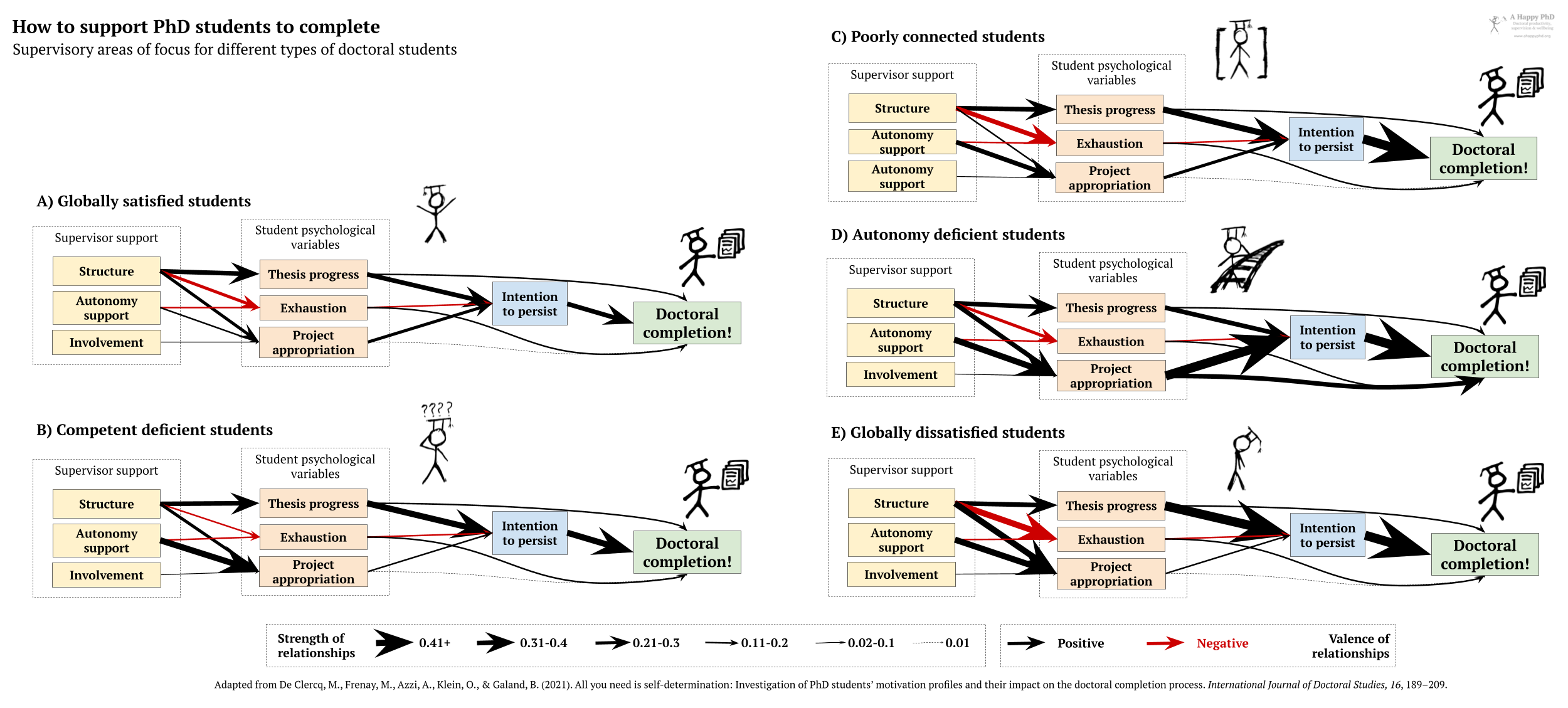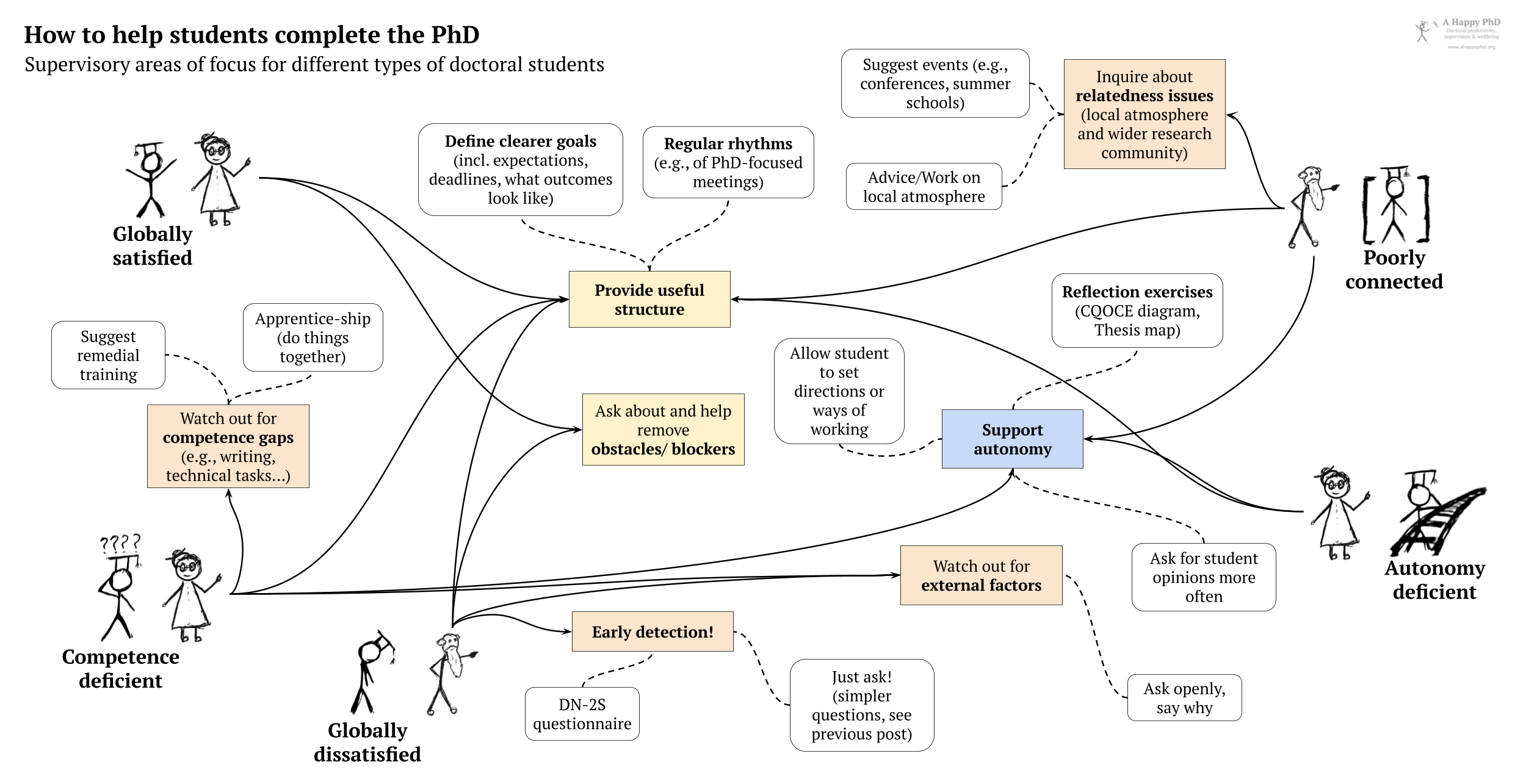POSTS
Supporting different types of students to complete their PhD (Study report)
by Luis P. Prieto, - 8 minutes read - 1671 wordsAside from PhD students’ own motivational factors (e.g., how much progress they perceive, or how exhausted they are), the support they receive from supervisors is another key aspect related to doctoral completion. In the continuation of last week’s “study report”, we discuss how different kinds of supervisor support relate to those motivational factors and, eventually, the finishing of the doctorate. We will also see how supervisors could foster these motivational aspects and help their students complete the PhD.
Expanding the general model of PhD completion with supervisor support
As we saw in last week’s post, researchers have used self-determination theory1 (SDT) to understand the motivational factors that lead some students to finish their PhDs, and so many others to drop out of it. In a nutshell, SDT posits that we are much more motivated to do something if we have autonomy, competence and relatedness in that task. We also saw the results from studies done in Belgium2,3,4, where researchers found three factors that influenced students’ intention to persist and completion of the PhD. These important psychological factors are: the perception of one’s own progress towards the PhD, our emotional exhaustion, and how much we appropriate the PhD research project (i.e., consider it our own). Finally, we saw that there are five different types of doctoral students (in terms of how much their basic SDT needs are covered). For each of these five profiles, progress, exhaustion and appropriation related to completion differently.
Yet, doctoral completion and all these motivational factors do not just depend on a PhD student’s actions. Our environment, and especially our supervisors, can also play a big role in whether those needs are met. I suspect that this is the main reason why I completed my PhD, even if some of the correlates of doctoral attrition were playing against me: my supervisors, and the larger research lab where I did my PhD, provided plenty of these needs, in my case.
What kinds of supervisor support are most helpful to foster these student motivational variables (progress, wellbeing and appropriation)? In the Belgian study4, they study three broad kinds of supevisor support3:
- Providing structure (in the form of concrete goals, regular rhythms, advice on how to plan effectively or how to face the inevitable obstacles of research). This is related to how doctoral students can progressively improve their competence.
- Being involved in the thesis project and the student’s development (e.g., providing emotional support, warmth and respect to the student). This can help with the feelings of relatedness.
- Supporting the student’s autonomy (e.g., letting the student voice opinions and define the direction or implementation strategy of the thesis project). This could help students make sense and appropriate their doctoral thesis.
Using the data from the study, we can thus expand the general model of doctoral completion we saw in the previous post, as shown below:
From the model above, we can already get some practical ideas as PhD supervisors. The most efficient strategy is to look for the “thickest path to completion”. It seems that providing structure not only supports progress the most (which is the most important student psychological factor). It also helps with exhaustion and (paradoxically) with appropriation. Research by the same authors suggests that this is especially relevant at the beginning of the PhD5. Hence, as a supervisor, I would look at the post on how to foster progress in PhD students, and brainstorm clearer structures and rhythms that may support them in advancing and appropriating their theses, without excessive distress (be it with more regular meetings or feedback, or clarifying expectations and goals that might be fuzzy at the moment).
However, since these support strategies have additive effects, I would not neglect the other two completely. In fact, it would make sense to talk to diagnose first. I would try to find out whether my doctoral student’s needs are covered, so that I can give more targeted support, as explained below.
Supporting different doctoral students to complete
One of the most interesting parts of this study is where they investigate the role that supervisor support seems to play in the completion each of the five “types of PhD students” (according to their motivational profile). The resulting, more specific models are summarized in the figure below:
How can supervisors best support each type of PhD student?
- Supervisors of globally satisfied students should focus on providing structure (e.g., clear goals, regular rhythms, etc.), as it influences positively both their progress and appropriation of the thesis. Structure also seems to help diminish emotional exhaustion. As we saw when talking about supervising for progress, the main role of the supervisor may be to remain aware of (and help remove) avoidable obstacles that these highly-motivated students encounter in their doctoral journey. In other words, to help students keep the “progress loop” going.
- Supervisors of competence deficient students should pay especial attention to structure as well. Secondarily, they can pay attention to supporting autonomy (which influences heavily the thesis appropriation in these particular students). The link between intention to persist and actual completion in these students is not so strong, which may signal external factors at play. As supervisors, we could investigate and give advice about these external factors (if we can). We can also target their “competence gaps”: find which research tasks they are having most trouble with, and advice or support students in acquiring them.
- Supervisors of poorly connected students should again focus on providing structure, which influences strongly both progress and exhaustion in this type of students. Supporting autonomy may also help appropriating the thesis project, but this factor is less influential than progress. Although the original study does not mention this, as supervisors we could also delve into why their relatedness is so low, and support students in this regard. Is it because of internal strife and bad atmosphere in the lab/research group? Is it the lack of a local research group? Insufficient connections with external researchers in the same topic? Etc.
- Supervisors of autonomy deficient students should support the student’s autonomy, since it strongly influences the appropriation of their thesis project (which in turn relates tightly to both intention to persist and completion). Enabling the student to voice opinions and take decisions about the direction or process of the PhD is essential when supervising these students. Still, offering useful structure also seems to have noticeable effects on the appropriation (as well as the perceived progress) of these students.
- Supervisors of globally dissatisfied students have the trickiest job, but also are the ones with highest chances of influencing their students’ psychological variables. Providing supportive structures (clear goals, procedures, rhythms in the research) seems to relate strongly to the student’s perceived progress, exhaustion and appropriation. Supporting student autonomy was also related to these students’ appropriation of their thesis. Yet, focusing on structure should probably come first. In these students, the link between the intention to persist and actual completion are the weakest, which again may hint at external factors that need to be unearthed and addressed. The authors of the study note that this profile should be detected as early as possible during the PhD, to avoid the student lagging too far behind in their doctoral process.
The picture below summarizes the areas and practices that supervisors should focus on, once they know the profile of their PhD students:
Caveat lector
All the usual caveats apply to the models and advice above. These are probabilistic models, average relationships… not certainties. These models come from a study in Belgian universities (which have particular rules, institutional supports and local cultures). Many other demographic, socio-economic and contextual factors may also play a role in students’ chances of completion, and there are always outliers and random events that can crash the PhD process… or lift it when everything seemed lost.
Yet, from my own experience as a PhD student, I can say that supervisor support is critical. Having a structure and a rhythm of talking with my supervisors, having the feeling that I could make choices about my PhD process, and knowing that I could count on my supervisors to talk things over if I got stuck (and that they cared about me and about the research)… made all the difference when problems or rejections hit me.
Yes, in the end I made my own choices and I finished my PhD. But these conditions made all the difference.
Good luck. And take care.
I am still quite new at giving supervisors advice. Were these models and practice ideas useful for you as a doctoral supervisor? Did they give you an insight into the choices and dilemmas your supervisor is facing (if you’re a PhD student)? Do you have other supervisory, motivational tips and tricks you would like to share? Let us know in the comments section below!
Header image by PxHere
-
Ryan, R. M., & Deci, E. L. (2000). Self-determination theory and the facilitation of intrinsic motivation, social development, and well-being. American Psychologist, 55(1), 68–78. ↩︎
-
Devos, C., Boudrenghien, G., Van der Linden, N., Azzi, A., Frenay, M., Galand, B., & Klein, O. (2017). Doctoral students’ experiences leading to completion or attrition: A matter of sense, progress and distress. European Journal of Psychology of Education, 32(1), 61–77. ↩︎
-
Van der Linden, N., Devos, C., Boudrenghien, G., Frenay, M., Azzi, A., Klein, O., & Galand, B. (2018). Gaining insight into doctoral persistence: Development and validation of Doctorate-related Need Support and Need Satisfaction short scales. Learning and Individual Differences, 65, 100–111. https://doi.org/10.1016/j.lindif.2018.03.008 ↩︎
-
De Clercq, M., Frenay, M., Azzi, A., Klein, O., & Galand, B. (2021). All you need is self-determination: Investigation of PhD students’ motivation profiles and their impact on the doctoral completion process. International Journal of Doctoral Studies, 16, 189–209. ↩︎
-
De Clercq, M., Devos, C., Azzi, A., Frenay, M., Klein, O., & Galand, B. (2019). I need somebody to lean on. Swiss Journal of Psychology. ↩︎

Luis P. Prieto
Luis P. is a Ramón y Cajal research fellow at the University of Valladolid (Spain), investigating learning technologies, especially learning analytics. He is also an avid learner about doctoral education and supervision, and he's the main author at the A Happy PhD blog.


